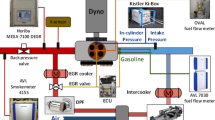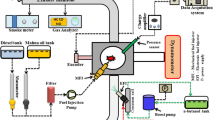Abstract
In the context of global efforts to pursue carbon neutrality, the research on the application of methanol fuel in diesel engines has ushered in a new peak. To identify the combined effects of methanol substitution rate (MSR) and EGR on the combustion process, performance and emission characteristics in methanol–diesel RCCI engines and provide a theoretical basis for the development of methanol engines, the parametric experiments were performed by changing the MSR, EGR rate, and engine load at 1800 rpm. The results showed that methanol-diesel RCCI combustion exhibited relatively longer combustion duration, lower maximum cylinder pressure and PPRR, higher BTE and lower ESFC, significantly higher HC and CO emissions compared to CDC combustion. The maximum in-cylinder pressure and PPRR are found to decrease with the increase in MSR as well as EGR rate. With the MSR increased from 0 to 30% without EGR at 90% load, the BTE increased by 4.02%, the ESFC decreased by 3.29%. At lower engine loads, further increasing MSR resulted in reduction of BTE and increasing ESFC, but the utilization of EGR improved the fuel economy. HC and CO emissions increased with increase in MSR and EGR rate, and decreased with increase in engine load. The soot emission reduced with the increase in MSR, and increased with the increase in EGR rate and engine load. NOx emissions decrease with increase in MSR and EGR rate. At 90% load, with the EGR rate increased from 0 to 20%, the NOx emission at 30% MSR can be reduced by 73.6%. With an increase in MSR, the NO emission decreases dramatically, while the NO2 emission gradually increases, which led to lower total NOx emission and higher NO2/NO rate. Methanol–diesel RCCI mode combustion with the support of EGR has potential to reduce the NOx emissions and improve the fuel economy.









Similar content being viewed by others
References
Zhao W, Yan J, Gao S, Lee TH, Li X (2022) The combustion and emission characteristics of a common-rail diesel engine fueled with diesel, propanol, and pentanol blends under low intake pressures. Fuel 307:121692. https://doi.org/10.1016/j.fuel.2021.121692
Chen H, He JJ, Chen ZM, Geng LM (2021) A comparative study of combustion and emission characteristics of dual-fuel engine fueled with diesel/methanol and diesel–polyoxymethylene dimethyl ether blend/methanol. Process Saf Environ Prot 147:714–722. https://doi.org/10.1016/j.psep.2021.01.007
Tian Z, Wang Y, Zhen XD, Liu ZB (2022) The effect of methanol production and application in internal combustion engines on emissions in the context of carbon neutrality: a review. Fuel 320:123902. https://doi.org/10.1016/j.fuel.2022.123902
Su CQ, Wei HR, Wang ZA, Ayed H, Mouldi A, Shayesteh AA (2022) Economic accounting and high-tech strategy for sustainable production: a case study of methanol production from CO2 hydrogenation. Int J Hydrogen Energy 47(62):25929–25944. https://doi.org/10.1016/j.ijhydene.2022.01.124
Verhelst S, Turner JW, Sileghem L, Vancoillie J (2019) Methanol as a fuel for internal combustion engines. Prog Energy Combust Sci 70:43–88. https://doi.org/10.1016/j.pecs.2018.10.001
Yang QC, Zhang Z, Fan YJ, Chu GY, Zhang DW, Yu JH (2022) Advanced exergy analysis and optimization of a CO2 to methanol process based on rigorous modeling and simulation. Fuel 325:124944. https://doi.org/10.1016/j.fuel.2022.124944
Sen R, Goeppert A, Prakash GKS (2022) Homogeneous hydrogenation of CO2 and CO to methanol: the renaissance of low-temperature catalysis in the context of the methanol economy. Angew Chem Int Ed 61(42):e202207278. https://doi.org/10.1002/anie.202207278
Wang J, Hao CN, Zhang QJ, Meng QR, Liu HM (2022) Research advances on photo-assisted CO2 conversion to methanol. Applied Catalysis A: General 643:118738. https://doi.org/10.1016/j.apcata.2022.118738
Jia ZQ, Denbratt I (2018) Experimental investigation into the combustion characteristics of a methanol-Diesel heavy duty engine operated in RCCI mode. Fuel 226:745–753. https://doi.org/10.1016/j.fuel.2018.03.088
García A, Monsalve-Serrano J, Villalta D, Guzmán-Mendoza M (2021) Methanol and OMEx as fuel candidates to fulfill the potential EURO VII emissions regulation under dual-mode dual-fuel combustion. Fuel 287:119548. https://doi.org/10.1016/j.fuel.2020.119548
Wang B, Yao AR, Yao CD et al (2020) In-depth comparison between pure diesel and diesel methanol dual fuel combustion mode. Appl Energy 278:115–664. https://doi.org/10.1016/j.apenergy.2020.115664
Duraisamy G, Rangasamy M, Govindan N (2019) A comparative study on methanol/diesel and methanol/PODE dual fuel RCCI combustion in an automotive diesel engine. Renew Energy 145:542–556. https://doi.org/10.1016/j.renene.2019.06.044
Saxena MR, Maurya RK, Mishra P (2021) Assessment of performance, combustion and emissions characteristics of methanol-diesel dual-fuel compression ignition engine: a review. J Traffic Trans Eng (English Edition) 8(5):638–680. https://doi.org/10.1016/j.jtte.2021.02.003
Chen ZM, He JJ, Chen H et al (2021) Comparative study on the combustion and emissions of dual-fuel common rail engines fueled with diesel/methanol, diesel/ethanol, and diesel/n-butanol. Fuel 304:121360. https://doi.org/10.1016/j.fuel.2021.121360
Ma BD, Yao AR, Yao CD et al (2020) Exergy loss analysis on diesel methanol dual fuel engine under different operating parameters. Appl Energy 261:114483. https://doi.org/10.1016/j.apenergy.2019.114483
Ning L, Duan Q, Kou H, Zeng K (2020) Parametric study on effects of methanol injection timing and methanol substitution percentage on combustion and emissions of methanol/diesel dual-fuel direct injection engine at full load. Fuel 279:118424. https://doi.org/10.1016/j.fuel.2020.118424
Jing Z, Zhang CH, Cai PP et al (2021) Multiple-objective optimization of a methanol/diesel reactivity controlled compression ignition engine based on non-dominated sorting genetic algorithm-II. Fuel 300:120953. https://doi.org/10.1016/j.fuel.2021.120953
Panda K, Ramesh A (2022) Parametric investigations to establish the potential of methanol based RCCI engine and comparison with the conventional dual fuel mode. Fuel 308:122025. https://doi.org/10.1016/j.fuel.2021.122025
Li YY, Chen H, Zhang CH, Chen H (2021) Effects of diesel pre-injection on the combustion and emission characteristics of a common-rail diesel engine fueled with diesel-methanol dual-fuel. Fuel 290:119824. https://doi.org/10.1016/j.fuel.2020.119824
Tao WH, Sun T, Guo WJ, Lu KB, Shi L, Lin H (2022) The effect of diesel pilot injection strategy on combustion and emission characteristic of diesel/methanol dual fuel engine. Fuel 324:124653. https://doi.org/10.1016/j.fuel.2022.124653
Liu JH, Wu PC, Ji Q, Sun P, Wang P, Meng ZW, Ma HJ (2022) Experimental study on effects of pilot injection strategy on combustion and emission characteristics of diesel/methanol dual-fuel engine under low load. Energy 247:123464. https://doi.org/10.1016/j.energy.2022.123464
Wang LJ, Liu JH, Ji Q, Sun P, Li J, Wei ML, Liu SK (2022) Experimental study on the high load extension of PODE/methanol RCCI combustion mode with optimized injection strategy. Fuel 314:122726. https://doi.org/10.1016/j.fuel.2021.122726
Ganesan N, Viswanathan K, Karthic SV, Ekambaram P, Wu W, Vo D-VN (2022) Split injection strategies based RCCI combustion analysis with waste cooking oil biofuel and methanol in an open ECU assisted CRDI engine. Fuel 319:123710. https://doi.org/10.1016/j.fuel.2022.123710
Elkelawy M, El Shenawy EA, Mohamed SA, Elarabi MM, Alm-Eldin Bastawissi H (2022) Impacts of EGR on RCCI engines management: a comprehensive review. Energy Conver Manag: X 14:100216. https://doi.org/10.1016/j.ecmx.2022.100216
Qu GF, Yao AR, Chen C, Ren JC, Yao CD (2021) Effect of EGR strategy on combustion and emission of DMDF engine for meeting China VI emission legislation. Fuel 299:120879. https://doi.org/10.1016/j.fuel.2021.120879
Macián V, Bermúdez V, Villalta D, Soto L (2019) Effects of low-pressure EGR on gaseous emissions and particle size distribution from a dual-mode dual-fuel (DMDF) concept in a medium-duty engine. Appl Therm Eng 163:114245. https://doi.org/10.1016/j.applthermaleng.2019.114245
Wang B, Yao AR, Chen C, Yao CD, Wang H, Liu MK, Li ZZ (2019) Strategy of improving fuel consumption and reducing emission at low load in a diesel methanol dual fuel engine. Fuel 254:115660. https://doi.org/10.1016/j.fuel.2019.115660
Chen DD, Wang T, Yang TT, Li GX, Chen Y, Qiao TY (2022) Effects of EGR combined with DOC on emission characteristics of a two-stage injected Fischer-Tropsch diesel/methanol dual-fuel engine. Fuel 329:125451. https://doi.org/10.1016/j.fuel.2022.125451
Wang L, Liang WW, Ma HR, Ji Q, Sun P, Liu JH (2023) Simulation study on effects of EGR ratio and compression ratio on combustion and emission characteristics of PODE/methanol RCCI engine. Fuel 334:126593. https://doi.org/10.1016/j.fuel.2022.126593
Elkelawy M, El Shenawy EA, Mohamed SA, Elarabi MM, Bastawissi HA-E (2022) Impacts of using EGR and different DI-fuels on RCCI engine emissions, performance, and combustion characteristics. Energy Conver Manag: X 15:100236. https://doi.org/10.1016/j.ecmx.2022.100236
Gürbüz H, Sandalcı T (2022) Numerical analysis of diesel injection strategies on emissions and performance in CH4/diesel powered RCCI diesel engine with high ratio EGR. Alex Eng J. https://doi.org/10.1016/j.aej.2022.09.012
Li J, Yu X, Xie JC, Yang WM (2020) Mitigation of high pressure rise rate by varying IVC timing and EGR rate in an RCCI engine with high premixed fuel ratio. Energy 192:116659. https://doi.org/10.1016/j.energy.2019.116659
Wu YF, Reitz RD (2015) Effects of exhaust gas recirculation and boost pressure on reactivity controlled compression ignition engine at high load operating conditions. J Energy Resour Technol 137(3):032210. https://doi.org/10.1115/1.4029866
Ahmad Z, Kaario O, Qiang C, Larmi M (2022) Effect of negative valve overlap in a heavy-duty methanol-diesel dual-fuel engine: a pathway to improve efficiency. Fuel 317:123522. https://doi.org/10.1016/j.fuel.2022.123522
Panda K, Ramesh A (2022) HCCI combustion of methanol along with diesel through novel injection strategies and its potential over conventional dual fuel combustion. Fuel 324:124766. https://doi.org/10.1016/j.fuel.2022.124766
Yıldız M, Çeper BA (2022) A comparative study on gasoline/diesel-fueled RCCI combustion at different premixed ratios and high-EGR diesel CI combustion in an IC engine under low load conditions. Fuel 324:124596. https://doi.org/10.1016/j.fuel.2022.124596
Jung DW, Iida N (2017) Thermal and chemical effects of the in-cylinder charge at IVC on cycle-to-cycle variations of DME HCCI combustion with combustion-phasing retard by external and rebreathed EGR. Appl Therm Eng 113:132–149. https://doi.org/10.1016/j.applthermaleng.2016.11.011
Zang RZ, Yao CD, Yin ZH, Geng PL, Hu JT, Wu TY (2016) Mechanistic study of ignition characteristics of diesel/methanol and diesel/methane dual fuel engine. Energy Fuels 30:8630–8637. https://doi.org/10.1021/acs.energyfuels.6b00716
Maurya RK (2017) Characteristics and control of low temperature combustion engines: employing gasoline, ethanol and methanol. Springer, Cham. https://doi.org/10.1007/978-3-319-68508-3
Agarwal AK, Shukla PC, Patel C, Gupta JG, Sharma N, Prasad RK, Agarwal RA (2016) Unregulated emissions and health risk potential from biodiesel (KB5, KB20) and methanol blend (M5) fuelled transportation diesel engines. Renew Energy 98:283–291. https://doi.org/10.1016/j.renene.2016.03.058
Liu JH, Ma HR, Liang WW, Yang J, Sun P, Wang XD, Wang YX, Wang P (2022) Experimental investigation on combustion characteristics and influencing factors of PODE/methanol dual-fuel engine. Energy 260:125131. https://doi.org/10.1016/j.energy.2022.125131
Lu H, Yao AR, Yao CD, Chen C, Wang B (2019) An investigation on the characteristics of and influence factors for NO2 formation in diesel/methanol dual fuel engine. Fuel 235:617–626. https://doi.org/10.1016/j.fuel.2018.08.061
Huang YH, Ng ECY, Surawski NC, Zhou JL, Wang XC, Gao JB, Lin WT, Brown RJ (2022) Effect of diesel particulate filter regeneration on fuel consumption and emissions performance under real-driving conditions. Fuel 320:123937. https://doi.org/10.1016/j.fuel.2022.123937
Acknowledgements
The authors are grateful for the support given by the Yunnan Province Science and Technology Program (Grant No. 202103AA080002) and National Innovation and Entrepreneurship Training Program for College Students (Grant No. 2021106740023).
Author information
Authors and Affiliations
Contributions
FH contributed to methodology, writing—review & editing, project administration. LL contributed to investigation, writing—original draft. MZ contributed to data curation, review & editing. MW contributed to methodology, formal analysis. LS contributed to writing—review & editing, investigation. JL contributed to formal analysis, supervision, conceptualization.
Corresponding authors
Ethics declarations
Conflict of interest
The authors declare they have no competing financial interests or personal relationships that might influence the present research.
Additional information
Technical Editor: Mario Eduardo Santos Martins.
Publisher's Note
Springer Nature remains neutral with regard to jurisdictional claims in published maps and institutional affiliations.
Rights and permissions
About this article
Cite this article
Huang, F., Li, L., Zhou, M. et al. Effect of EGR on performance and emissions of a methanol–diesel reactivity controlled compression ignition (RCCI) engine. J Braz. Soc. Mech. Sci. Eng. 45, 440 (2023). https://doi.org/10.1007/s40430-023-04289-5
Received:
Accepted:
Published:
DOI: https://doi.org/10.1007/s40430-023-04289-5




